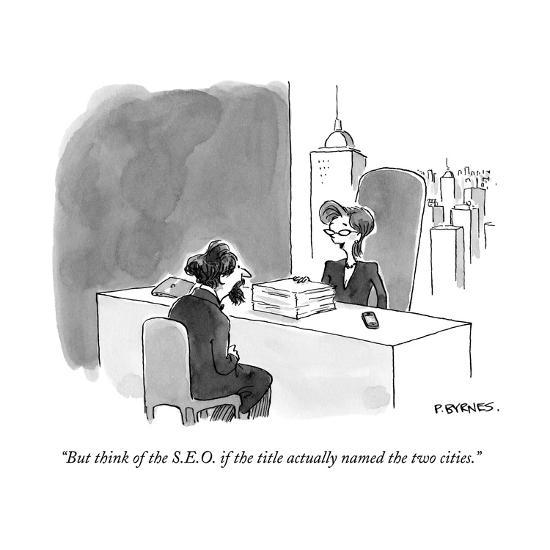Paul Whybrow
Full Member
The longevity of our books is something that few of us think about, in the dispiriting scrabble to get published in the here and now. As William Saroyan observed:
Writing is the hardest way of earning a living, with the possible exception of wrestling alligators.
Contemplating which successful and influential books published in the last thirty years will become classics, revered through the ages, it's easy to be swayed by titles that sold in their millions, but surely there should be more to a book's worth than earning money. J. K. Rowling's books contain life lessons that will be relevant through time, whereas E. L. James output will swirl down the plughole.
will swirl down the plughole.
A classic is a book that has never finished what it has to say.
Italo Calvino
A salutary thought is, that many books that are lauded as classics probably wouldn't get published these days, initially rejected by literary agents, the gatekeepers of publishing, for being too slow to start, too long, too wordy with a confusing plot populated by unbelievable characters.

What made me think of this thread, was researching the life of a forgotten mid-20th-century writer called Robin Hyde. I came across one of her poems in a newsletter, which prompted me to order her only book in Cornwall's library system. It's a novel called Check To Your King, which was first published in 1936. It hadn't been borrowed from the reserve stock at library headquarters since 1996. Robin Hyde had a sad life, but was productive as a writer, until she ended things when the struggle became intolerable.
Hyde, Robin
She wasn't as successful as she should have been for the huge effort she put into her writing, but even wildly popular authors disappear into the mists of time:
Some writers achieve great popularity and then disappear forever. The bestseller lists of the past fifty years are, with a few lively exceptions, a sombre graveyard of dead books.
Carlos Fuentes
With my own writing, any ambition I have is confined to maybe making a few quid, while entertaining crime fiction fans and making them think a bit about the issues I raise about life in the early 21st-century. The idea of writing for posterity, of being mentioned in the same breath as masters of the crime genre, such as Raymond Chandler, Arthur Conan Doyle, Agatha Christie, James Lee Burke and Elmore Leonard, is laughable to me.
How about you?
Will your gravestone become a place of pilgrimage for legions of loyal fans?
How do you feel about having your biography written by some nosy journalist?
Will your family be squabbling over the rights to your work, after you pass?
I like what one of my writing heroes Richard Brautigan said:

Writing is the hardest way of earning a living, with the possible exception of wrestling alligators.
Contemplating which successful and influential books published in the last thirty years will become classics, revered through the ages, it's easy to be swayed by titles that sold in their millions, but surely there should be more to a book's worth than earning money. J. K. Rowling's books contain life lessons that will be relevant through time, whereas E. L. James output
A classic is a book that has never finished what it has to say.
Italo Calvino
A salutary thought is, that many books that are lauded as classics probably wouldn't get published these days, initially rejected by literary agents, the gatekeepers of publishing, for being too slow to start, too long, too wordy with a confusing plot populated by unbelievable characters.

What made me think of this thread, was researching the life of a forgotten mid-20th-century writer called Robin Hyde. I came across one of her poems in a newsletter, which prompted me to order her only book in Cornwall's library system. It's a novel called Check To Your King, which was first published in 1936. It hadn't been borrowed from the reserve stock at library headquarters since 1996. Robin Hyde had a sad life, but was productive as a writer, until she ended things when the struggle became intolerable.
Hyde, Robin
She wasn't as successful as she should have been for the huge effort she put into her writing, but even wildly popular authors disappear into the mists of time:
Some writers achieve great popularity and then disappear forever. The bestseller lists of the past fifty years are, with a few lively exceptions, a sombre graveyard of dead books.
Carlos Fuentes
With my own writing, any ambition I have is confined to maybe making a few quid, while entertaining crime fiction fans and making them think a bit about the issues I raise about life in the early 21st-century. The idea of writing for posterity, of being mentioned in the same breath as masters of the crime genre, such as Raymond Chandler, Arthur Conan Doyle, Agatha Christie, James Lee Burke and Elmore Leonard, is laughable to me.
How about you?
Will your gravestone become a place of pilgrimage for legions of loyal fans?
How do you feel about having your biography written by some nosy journalist?
Will your family be squabbling over the rights to your work, after you pass?
I like what one of my writing heroes Richard Brautigan said:


